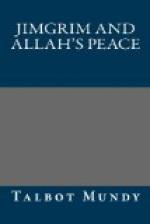“What time is the mejlis?” I asked.
“At noon.”
“Then I’ll go and hunt up my interpreter.”
Ben Nazir came out with me, in a blazing bad temper. He was as jealous as a pet dog, and inclined to visit the result on me.
“Very polite, I am sure! Most refined! Most courteous! In your country, sir, does a guest reward his host for hospitality by talking in a language that his host can’t understand? Perhaps you would rather transfer your presence to Abdul Ali’s house? Pray do not consider yourself beholden to me, in case you would prefer his hospitality!”
I tried in vain to pacify him. I explained that the choice of language had been Abdul Ali’s, and offered to tell him now in French every word that had passed. But he would not listen.
“It would not be difficult for a man of your intelligence to make up a story,” he said rudely.
“Abdul Ali can talk French. If it had been intended that I should know the truth that conversation would have been in French. Shall I send your bag to Abdul Ali’s house?”
“No,” I said. “Give it to Anazeh. He is answerable for my safety until I reach Palestine again. Thank you for a night’s lodging.”
He walked away in a great huff, and I set out for the house of Abu Shamah, using my scant store of Arabic to ask the way. Mahommed ben Hamza was lolling on the stone veranda, gossiping with half-a-dozen men. He came the minute I beckoned him.
“I’ve seen Jimgrim,” I said. “You’re to come with me at noon to the mejlis as my interpreter.”
He grinned delightedly.
“And see here, you smelly devil: Here’s money. Buy yourself a clean shirt, a new coat, and some soap. Wash yourself from head to foot, and put the new clothes on, before you meet me at the castle gate ten minutes before noon. Those are Jimgrim’s orders, do you understand?”
“Taht il-amr! (Yours to command)” he answered laughing.
I went and bought myself an awful meal at the house of a man who rolled Kabobs between his filthy fingers.
Chapter Seven
“Who gives orders to me?”
The wonderful thing about Moab is that everything happens in a story-book setting, with illustrations by Maxfield Parrish and Wyeth and Joe Coll, and all the rest of them, whichever way you look.
Imagine a blue sky—so clear-blue and pure that you can see against it the very feathers in the tails of wheeling kites, and know that they are brown, not black. Imagine all the houses, and the shacks between them, and the poles on which the burlap awnings hang, painted on flat canvas and stood up against that infinite blue. Stick some vultures in a row along a roof-top— purplish—bronze they’ll look between the tiles and sky. Add yellow camels, gray horses, striped robes, long rifles, and a searching sun-dried smell. And there you have El-Kerak, from the inside.




